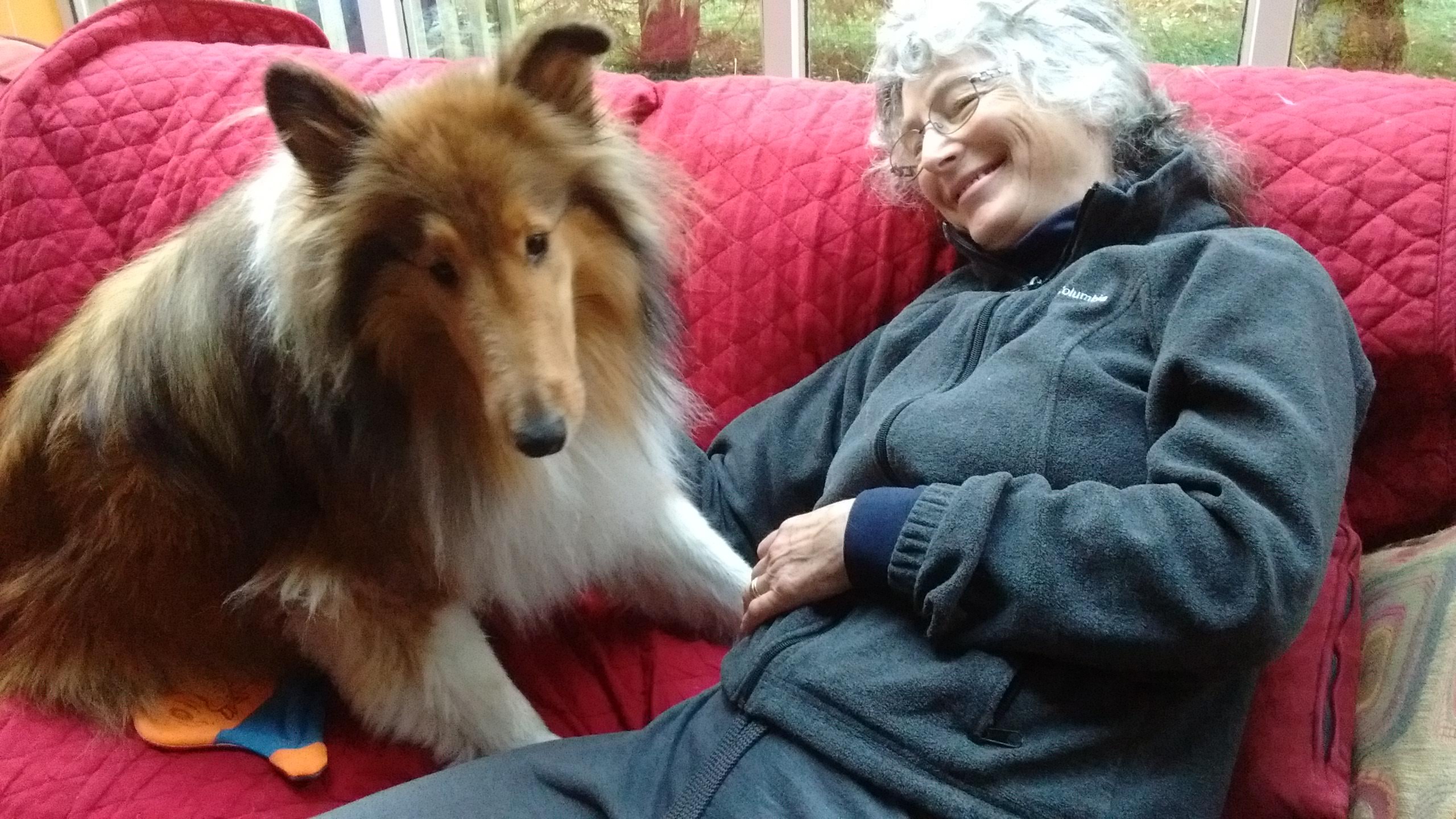There are many veterinarian-authored articles that articulate the precise symptoms to watch for to decide whether or not your dog is ill. In this blog, however, I’m going to talk about the more subtle signs to watch for in your dog. It’s not always easy to tell if your dog is just tired or really not feeling well–if you should jump to attention and rush to the emergency vet, or let time pass and observe him. These are some things I’ve learned after 35 years of living with dogs.
Tips for understanding your dog
Dogs communicate with their bodies. The tension and lines in their faces, the position of their ears and the wrinkles on their brows communicate only part of how they are feeling. The arc of their backs, the position of their tails, and their level of energy, whether panting and pacing, leaping and barking, or curling into a lethargic ball all give us clues. Sometimes dogs who don’t feel well will cling to us, sometimes they will keep their distance and refuse to be touched. Every dog is different, and that makes it difficult to decipher their signals until you know your dog well.

- Get into the habit of observing your dog carefully. Your dog is constantly communicating with you, the other pets in your house and the world around him.
- Get a good book on canine body language such as Brenda Aloff’s “Canine Body Language” to help you interpret his normal signs of communication.
- Watch for changes in energy patterns…is your dog panting and pacing more than usual? Is he suddenly more energetic or frantic– more outgoing or crazy than normal? Is he sleeping more than usual? Not as interested in being near you? Is he clinging to you? Is his back arched? These behaviors paired with a decrease in appetite, diarrhea stool or blood in the stool, vomiting, limping etc, could tip you off that he is experiencing more than just an isolated symptom, and that your dog is feeling ill or is in pain. In other words, you should contact your vet ASAP.
- An arched back along with panting and pacing could be associated with abdominal pain, and a call or trip to the emergency vet is definitely advised as this could be very serious.
- Lola would shut down when she wasn’t feeling well, but Vera would pant and pace, or leap and spin and bark, unable to settle. Her behavior could be mistaken for a sudden surge of playfulness, where in actual fact, paired with a decreased appetite, we would finally figure out that she was in pain.

- Annie, who recently had blood in her stool, let us know how dreadful she felt by avoiding physical contact one moment, then appearing by my side and asking for reassurance the next. She refused breakfast and treats, but then ate a small amount in the afternoon. Rather than settling for a nap after her snack, she became frantic to get outside and walked quickly ahead of me at the end of the leash, her head down, the sides of her mouth pulled back in stress, tail tucked, and was not at all interested in the smells that usually capture her interest. At that point, we took her to the vet.

Annie yawning to show stress 
Annie looking away from the camera, also a sign of stress
- Lip licking, yawning, and turning away from you are other signs of stress and though dogs use these signals constantly to negotiate space, they can be used more frequently in conjunction with other body language if they are not feeling well.
- Looking directly at your hand, and tensing or flinching or moving away when you touch certain parts of their bodies–legs, paws, back or abdomen, could alert you that the area is painful.
- Take some time to get to know your vet before you actually need to visit him/her. Having a trusting relationship with your vet is as important as trusting your own doctor.
- Have emergency phone numbers in your phone. Animal Poison Control hotline has poison expert veterinarians available online 24/7, and the Pet Poison Helpline offers help 24/7 to both vets and owners at 800-213-6680.

Great post, Kerry. So much subtlety involved when we really try to read our animals. Thanks for the very specific pointers that are so easy to miss!
LikeLike
Thank you, Sabine! I’m glad you enjoyed it!
LikeLike
Our older dog was panting, panting. We mentioned this to our vet and he told us excessive panting was often a sign of pain. We increased her arthritis meds and the panting stopped.
LikeLike
Yes, this is a really common sign of pain, but in the summer can be mistaken for one’s dog being hot. I’ve been twisted in knots in the middle of the night trying to decide if my senior dog was in pain or overheated. If only they could speak our language!!! I’m glad the pain meds helped, Edwina!
LikeLike
So fill us in. How is Annie? What did the vet say?
LikeLike
Annie recovered. She was placed on Metronidazole and after a few days, was back to her old self. I was worried. It was very out of character for her. Thanks for asking!
LikeLike